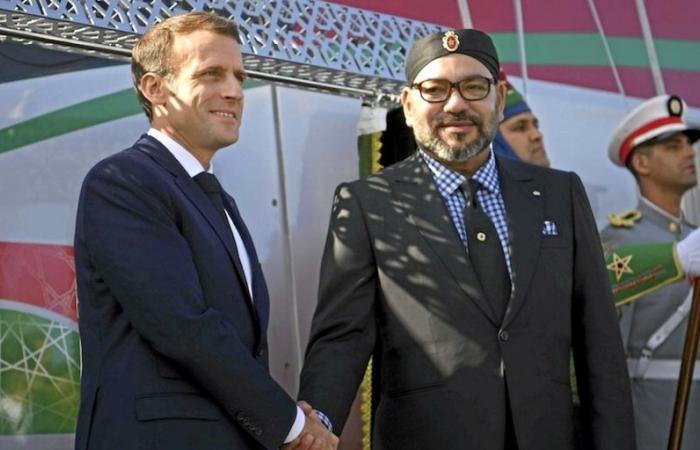” VS“It’s an earthquake, an electric shock,” says a Moroccan journalist on a national radio station while commenting on the results of the European elections. And continued: “Never before have we witnessed such a significant rise of populists in the European Union. » Proof if any were needed that the effects of the political earthquake which is shaking Europe, and France in particular, are being felt well beyond the borders of the Old Continent. The nationalist surge during the European elections continues to provoke numerous reactions on the southern shore of the Mediterranean.
Living in Morocco and voting RN: contradictory?
Particularly in Morocco where the surprise announcement by French President Emmanuel Macron to dissolve the National Assembly, after the proclamation of the results giving the far right in the lead, continues to stir up the debate.
And for good reason: if the French living in the Cherifian kingdom largely placed the party of La France insoumise (LFI) at the top of the ballot with 3,350 votes, or 38% out of more than 41,274 registered on the electoral lists, the parties of The extreme right has seen clear progress. “Although voter turnout was disparate across cities, the elections delivered intriguing results, illustrating varied trends and disparate political dynamics,” observes the French-speaking daily Eco inspirations.
If the LFI dominated in several Moroccan cities, like Fez, Casablanca, Rabat and Tangier, the RN, for its part, displayed a significant presence in Agadir and Marrakech, where it obtained higher scores. But it is mainly the electoral choice of the French people of Agadir which surprises, where 23% of voters voted RN.
These results surprised more than one in the Cherifian kingdom, including the writer Fouad Laroui, who titled his column published on the information site Le360: “Why is Agadir voting RN? » The famous Moroccan author does not hide his astonishment: “… all this does not concern us, as long as it is expressed in Trécon in Marne or in Saligos in the Hautes-Pyrénées. But in Agadir? Agadir! I was almost born there, in Agadir. »
However, if we take into consideration the very high abstention rate, these figures are not representative, according to Mehdi Alioua, sociologist, migration specialist at Sciences Po Rabat of the International University of Rabat (UIR ). Questioned by the Yabiladi electronic medium, the sociologist provides an explanation linked to the fact that “some of the French who are settled there are retirees or entrepreneurs”. In other words: “French people who come there for the sun, to do business and ultimately the Moroccan question interests them little. Ultimately what they like in Morocco is the fairly strong social hierarchies since we have significant social inequalities and the fact that we are not a liberal democracy. So it goes well with their ideology. Living in Morocco and voting for the National Rally is not at all contradictory,” he added.
The shock wave of dissolution resounds all the way to Rabat
The shock wave of dissolution continues to shake even beyond the European area. “France is at a critical crossroads, and the whole world is watching with sustained attention the sequence of events which could surprise us even more than the Russian roulette that Macron gives the impression of liking,” we read in an editorial on the Morocco diplomatic information site, where the author describes the French president’s decision as a “high-risk bet”.
This presidential decision, with multiple consequences, is already shaking up the political agenda. Scheduled for July, the visit to Rabat by the head of government, Gabriel Attal, was in fact canceled, as reported by the information site atlasinfo.fr. The French official, who was to participate in the high joint commission between the two countries and prepare the head of state’s visit to Morocco, must now lead the campaign for early legislative elections.
What if the rise of the far right was not necessarily bad news for Rabat? The French-speaking daily Opinion underlines that the LFI must not be reduced to its leader and considered as an ally of the Kingdom. “The attitude of LFI MEPs, including its head of the list, Manon Aubry, shows the opposite. She who voted for all the anti-Moroccan resolutions in the European Parliament,” recalls the author of this article, Anass Machloukh. While the RN has already expressed “proposals in favor of the territorial integrity of the Kingdom”, he explains.
This major turning point in French policy, it must be said, closely concerns Morocco, which expects recognition of its territorial integrity. It is in this wake that the publication director of the Panorapost site, Aziz Boucetta, recalls the words of Marine Le Pen in 2022, on her foreign policy: “I wish to maintain and enrich relations with the three countries of the Maghreb… with the Morocco, which is dear to us. »
However, Morocco cannot be selective in the choice of the ideological orientations of its allies. For him, “if the RN gains access to the government and directs it, and if it decides to recognize Western Sahara for what it is, that is to say Moroccan, it will be the France of extreme right who will have done it. But in far-right France, there is “France”, and that’s the main thing.”
What future for the Rabat-Paris axis?
Legislative elections, like any other type of election, involve varied and complex issues, particularly on the geopolitical level. What about the France-Morocco relationship, which has just begun to experience a period of warming in recent months?
Asked by Africa Point, Moroccan political scientist Zakaria Aboudahab considers that the future of Morocco-France relations depends on two structuring forces, firstly France’s European anchoring. “Bilateral relations have a European extension, and France is a very important country from this point of view. As a result, the new political situation in this country will necessarily have repercussions on the Rabat-Brussels axis,” he observes.
Professor Aboudahab secondly cites the different ecosystems that weigh in the balance of foreign policy. “Beyond the distribution of political colors, we must take into consideration the weight of the security apparatus, the diplomatic apparatus, etc. I could even broaden the spectrum by including the role of French civil society, but also that of the Moroccan diaspora,” he adds. And to continue: “Whatever government is installed, there is a tradition of Morocco-France relations, and this foundation, essential in my opinion, will govern the future of this relationship,” he underlines. , recalling the announcement of public financing of private projects in the Sahara.
If it is difficult so far to paint a precise picture of the potential alliances that will be created and to determine their impact on the Rabat-Paris axis, one thing is certain: “Whether with the left or the right, Morocco will adapt its operating mode and will know how to dialogue with the French government. However, we must wait for the results of the elections to, in my opinion, be able to better appreciate Morocco’s position in relation to the new French political situation,” concludes our interlocutor.






